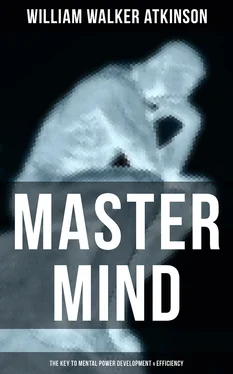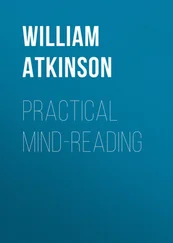All mental analysis brings the individual to the realization that at the very center of his mental being there abides and dwells a Something—and he always calls this "I"— which is the permanent element of his being. While his sensations, his feelings, his emotions, his tastes, his thoughts, his beliefs, his ideas, and even his ideals have changed from time to time, he knows to a certainty that this "I" has been permanent, and that it is the same old "I" that has always been present during his entire life, from his earliest days. He knows that although his emotional nature, and general mental physical character may have undergone an almost total transformation and change, yet this "I" has never been really changed at all, but has ever remained "the same old I." It is as if this "I" was an individual who had worn many successive coats, or shoes, or hats, but always remained the same individual. The consciousness of every individual must always so report to him, when the answer is demanded of it.
And, moreover, while the individual may and does change his sensations, his feelings, his tastes, his passions, his emotions, and his whole general character in some cases, he is never able to change in the slightest degree this Something Within which he calls "I." He can never run away from this "I," nor can he ever move it from its position. He can never lift his "I" by means of his mental bootstraps; nor can his personal shadow run away from this "I" of his individuality. He may set apart for consideration each and every one of his mental experiences, his sensations, his thoughts, his feelings, his ideas, and all the rest; but he can never set off from himself this "I" for such inspection. He can know this "I" only as his self, that Something Within at the very center of his consciousness.
A writer has said of this Something Within, which we call "I": "We are conscious of something closer to the center than anything else, and differing from the other forms in being the only form of consciousness to which we are not passive. This Something is in the normal consciousness of each of you, yet it is never a part of sensation, nor emotion, but on the contrary is capable of dominating both.
Sensations originate outside and inside of the body; Emotions originate inside of the body. But this Something is deeper than either, and they are both objective to it. We cannot classify it with anything else. We cannot describe it in terms of any other form of consciousness. We cannot separate ourselves from it. We cannot stand off and examine it. We cannot modify it by anything else. It, itself, modifies everything within its scope. Other forms of consciousness are objective in their relation to it, but it is never objective to them. There is nothing in our consciousness deeper. It underlies and overlies and permeates all other forms, and, moreover,—what is of immeasurably greater importance,—it can, if need be, create them."
Another writer has said: "The 'I' is the Thinker, the Knower, the Feeler, the Actor. Its states of consciousness are constantly changing—different today from those of yesterday, and different tomorrow from those of today—but the 'I,' itself, is always the name. Just what this 'I' is, we cannot tell. This riddle has never been solved by the reason of man. So subtle is its essence that it is almost impossible to think of it as a something apart from its mental states. All that can be said of it is that it is. Its only report of itself is 'I Am.' You cannot examine the 'I' by the 'I.' You must have an object for your subject; and if you make the 'I' your object, you have no subject left to examine it. Place the 'I' under the mental microscope to examine it, and lo! you have nothing to look through the glass —there is no 'I' at the eye-piece of the microscope to examine it. The 'I' cannot be at both ends of the glass at the same time. Here, at last, you have found an Ultimate Something which defies all analysis, refinement, or separation."
This Something Within—this "I"—is that entity which in philosophy and metaphysics has been called "The Ego"; but such name does nothing in the way of defining it. You need not stop to speculate over "just what" the Ego is, for you will never learn this. All that you can know is that it IS—and you know this from the ultimate report of your own consciousness, and in no other way, for nothing outside of yourself can make you know this otherwise.
This Ego is the Mind Master—the Central Authority of your Mind. It is this that is able to master, control, manage, rule, regulate and direct all of your mental faculties, energies, powers, forces, and mechanism. It is this Ego, when fully awakened into activity, which constitutes the essence of the Master Mind.
Your task is not to try to learn "just what" the Ego is, for as has been said, you will never know this. Your task is to strive to awaken it into active consciousness, so that it may realize its power and begin to employ it. You can awaken it by the proper mental attitude toward it—by the conscious realization of its presence and power. And you can gradually cause it to realize its power, and to use the same, by means of exercises calling into play that power. This is what Will Power really means. Your Will is strong already—it does not need strengthening; what is needed is that you urge your Ego into realizing that it can use your Will Power, and to teach it to use the same by means of the right kind of exercises. You must learn to gradually awaken the half-asleep Giant, and set it to work in its own natural field of endeavor and activity. In this book the way will be pointed out to you so that you may do this; but you will have to actively DO the thing, after being shown how He who will, carefully consider the above statements of truth, and will make them apart of his mental armament, will have grasped the secret of the Master Mind.
Chapter 3
The Slave Will and The Master Will
Table of Content
All deep students of psychology discover that the Will is the innermost, garment of the Ego—the mental sheath which lies beneath all the others, and which clings closely to the substance of the Ego, so closely that it can scarcely be distinguished from its wearer. And so, the race has become accustomed to identifying the Will with the Ego. For instance, we speak of a "weak will," or a "strong will," a "vacillating will," or a "persistent, determined will"; when we really mean to indicate the different degrees of the activity and expression of the Ego itself.
Perhaps you will get more clearly this conception of the Ego behind the Will, if we continue our illustration of the Ego as sleeping in the cast of the great masses of the race, half-awake in the smaller portion of the race, and wide-awake in the elect few who may be called the Master Minds. While this illustration is of course figurative, it is based upon the actual facts of the case before us, and, moreover, comes so closely to the real manifestations of the Ego that it may he used in almost a literal sense.
The sleeping Ego is like a person wrapped in slumber, who is almost unconscious, but who will "turn over," or "move over" at the command of the bedfellow. In some cases the degree of waking-consciousness is somewhat higher, as in the case of the child who, half roused from slumber, will do what it is told by its parent, but without clearly realizing just what it is doing. This illustration may be carried even still further, and the sleeping Ego compared to the somnambulist, or "sleep-walker," who "goes through the motions" of performing many tasks and actions, but who is but very dimly conscious (or practically unconscious) of just what he is doing or how he is doing it.
The masses of the race, in whom the Ego is dwelling in this condition, are really little more than automatons. Their wills are called into activity by every passing desire, their passions and desires are uncontrolled, and their thought-processes are the result of suggestions made by others but which they accept and then fondly imagine they have thought the thing for themselves. They are like the wind-harps upon which the winds of the passing breeze blow, and from which the responsive sounds are produced. It is a fact known to careful students of psychology that in the case of the masses of the race the mental processes, and the will activity, are practically those of an automaton, or psychical machine, there being little or no voluntary effort exerted or voluntary choice or decision made.
Читать дальше












